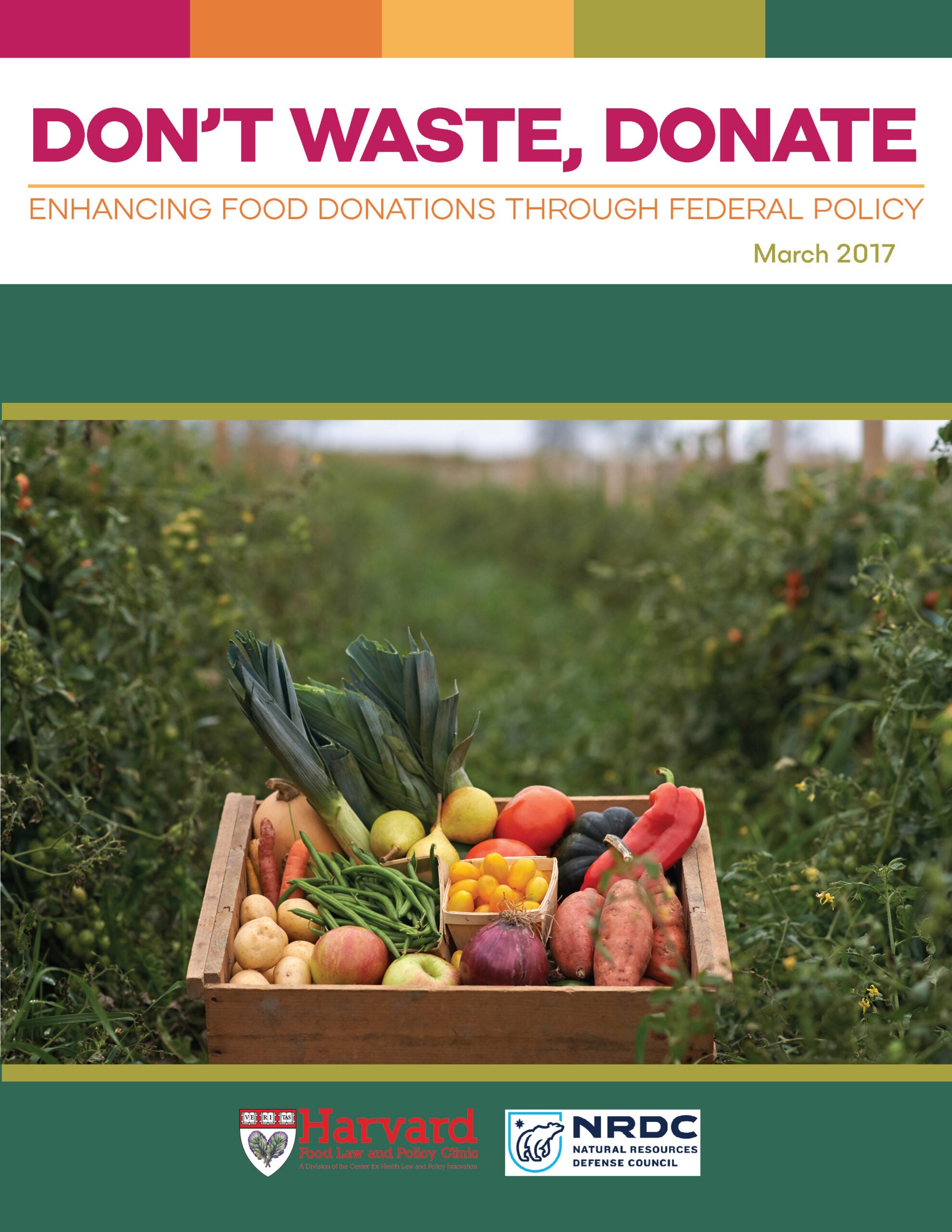On March 9, the Food Law and Policy Clinic of Harvard Law School (FLPC) and the Natural Resources Defense Council (NRDC), released “Don’t Waste, Donate: Enhancing Food Donations through Federal Policy” presenting actions the federal government should take to better align federal laws and policies with the goal of increasing the donation of safe surplus food. Such food recovery has the potential to address the coupled issues of food waste and food insecurity in the United States, reducing the 40% of food that is wasted by instead getting edible food onto the plates of those in need.
In 2015, the federal government made reducing food waste a national priority through the announcement of a national goal of reducing food waste by 50 percent by 2030. In this report, FLPC and NRDC lay out a variety of policy opportunities that help the federal government meet this goal. The report identifies a number of federal laws and policies that strive to enhance food recovery, but fail to address the evolving needs of the food donation landscape or reduce unnecessary barriers to donation. For example, under current laws, if an entire manufacturing run of yogurt has a misprint with the incorrect net weight, the manufacturer would not benefit from the liability protections or tax incentives meant to encourage food donation unless every container were re-labeled with the correct number of ounces. These types of hurdles do nothing to protect consumers and everything to discourage food donations. Fortunately, simple and targeted changes to federal policy can reduce these senseless barriers.
“Don’t Waste, Donate” offers 16 actionable recommendations spanning five key areas of federal policy that can increase the amount of safe, wholesome food donated to those in need. The report recommends policy changes that would:
- Enhance liability protections for food donations;
- Improve federal tax incentives for food donations;
- Standardize and clarify expiration date labels;
- Better monitor and encourage food donation by federal agencies; and
- Modernize and clarify food safety guidance for food donations.
The report also includes an appendix targeting specific recommendations directly to Congress, the U.S. Food and Drug Administration, and the U.S. Department of Agriculture. If even a quarter of the recommendations in the report were embraced and implemented, millions of pounds of wholesome food would make it to those in need, rather than clogging up our landfills.
While an abundance of food is produced in the U.S., 40% of this wholesome, healthy, and safe food ultimately ends up in the landfill. At the same time, nearly 45 million individuals, including 13 million children, are food insecure, meaning that at some point during the year they lack access to a sufficient amount of food to lead an active, healthy lifestyle. Food donations provide a mechanism for immediate relief of food shortages and are an essential resource that food insecure individuals rely on to feed themselves. The recommendations in “Don’t Waste, Donate” can help the federal government better align federal laws and policies with the objective of increasing donation of safe surplus food to those in need.
Legislators and industry have already taken significant steps to implement some of the recommendations in the report. For example, the Food Marketing Institute and the Grocery Manufacturers Association, the two largest grocery industry trade groups, recently launched a nationwide voluntary standard for retailers and manufacturers to streamline date labels on consumer-facing food packages. “Don’t Waste, Donate” explains how standardizing date labels can impact donations of safe past-date foods and why federal action is needed to support and enshrine these voluntary standards, as well as ensure that safe past-date food is allowed to be donated. Additionally, recently introduced bipartisan federal legislation (The Food Donation Act of 2017) would enhance the liability protection for food donations in several ways that mirror the key policy changes recommended by the Food Law and Policy Clinic and NRDC in “Don’t Waste, Donate.”
Over the past few years, FLPC has released various reports with policy recommendations for reducing food waste targeted at various actors and levels of government. While this report focuses on federal policy, a previous report released in fall 2016, “Keeping Food Out of the Landfill,” proposed policy tools specific to states and localities. Additionally, FLPC plans to release another report next month on a range of opportunities to reduce food waste through the next U.S. Farm Bill, the largest piece of U.S. food and agriculture legislation. Given the strong bipartisan support for measures to reduce food waste, the emerging discussions around the 2018 Farm Bill are an exciting opportunity to include food waste in broader policy debates about the food system.
For more news on the Food Law and Policy Clinic, visit the Food Law blog.
The Food Law and Policy Clinic is part of the Center for Health Law and Policy Innovation at Harvard Law School.
